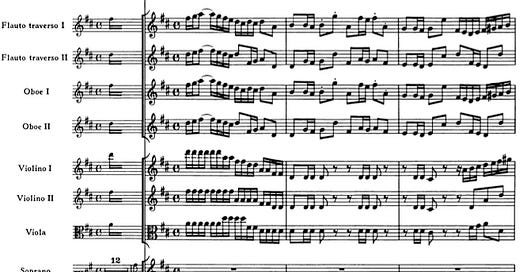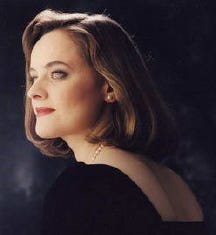October 17: Cantatas (Bach-Ensemble; Helmuth Rilling, conductor)
On two seconds among thousands
Witness the fundamental ridiculousness of my yearlong Bach adventure, my aspirations towards completeness like mapping the galaxy with a candle.
This week’s playlist covered five hours of Cantatas, but the very first bar just knocked me over. Here’s the opening of BWV 195, Dem Gerechten muß das Licht “The light shall ever rise again for the righteous”:
In measure one, you’re immediately blasted with a full orchestra, no time to get your bearings. There’s a trumpet fanfare that dips and swoops in three distinct rhythmic phrases, and they’re competing with an insistent string section hacking sixteenth notes with their own three melodic patterns. The woodwinds counter the upward slope of the brass, while the bass section plays the only dotted note, leaving the whole edifice poetically unsteady.
This all takes two seconds.
By contrast, this post covers about 20,000 two-second intervals. What am I even doing here?
There’s a consolation in this, if you squint: if too much greatness behind us to fully grasp all of it in a lifetime, I can grab some golden crumbs, and it’s fine.
This year, strangely, and for the first time in my life, I’ve been in a mood where it seems like it’s going to be okay even if don’t read everything.
Bach’s audience would have heard this cantata once in their lives, each bar a dream receding. I’m blessed with the chance to loop the first bar of this piece over and over, and to recommend you do the same for whatever thing rings your bells.
This is my penultimate post on Bach’s Cantatas, covering BWV 193-8, 201, 205, 211-3, performed by the Bach-Ensemble conducted by Helmuth Rilling, plus the Trio in F Major, BWV 1040. On to highlights.
The opening of BWV 198 is an ominous dance, and what a fakeout at 0:44:
Bach uncharacteristically breaks the singers into multipart features in the fifth movement of BWV 195:
This set includes some secular works including the “Coffee” and “Peasant” cantatas, and a setting of the Phoebus and Pan myth. Some of these works are breezy — and that’s not quite the Bach I’m chasing. Anyway, here’s an ode to coffee sung by Christine Schafer, from BWV 211:
BWV 201 gets off to a zippy start:
The recitative in BWV 205 features the creamy caramel alto of Ingeborg Danz:
Listen to Thomas Quasthoff enunciate here. His mouth cavity must be a perfect sphere. From BWV 212:
The soprano Sibylla Rubens is lovely in BWV 213:
The BWV 1040 Trio in F Major snuck into this playlist. I don’t have perfect pitch, but when I heard this perfect little piece, it felt very “F”. B flat is a great note. Anyway, check it:
On deck for next week: The Well Tempered Clavier, Book II, by Glenn Gould.






Interesting point about Bach's ability to write 'breezy' music along with his deep, spiritual cantatas. The versatility in his output is only one reason I love and respect him so much as a composer. Am I sad/melancholic? The double violin concerto largo or the solo partita in D minor (in full, not just the 'chaconne'). Am I seeking solace or catharsis? Organ works. Am I in desperate need to be alone, think, and analyze (staples of accounting work)? WTC or Musical Offering. Something lighter and brighter? Brandenburg (esp 6) or Orchestral Suites. That 'coffee' cantata definitely sounds like drinking lots of it is a prerequisite to singing it. Love the trio sonata. You're right, it's "very 'F'". I'm going to familiarize myself with this set of Bach pieces. Eagerly anticipating WTC book 2!
Still here on this journey with you. Thank you You have inspired me to read a couple Bach biography's to go along with your music analysis
Bucket list would be the Bach organ tour if it is still going on.